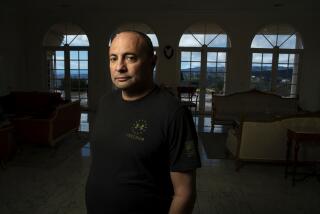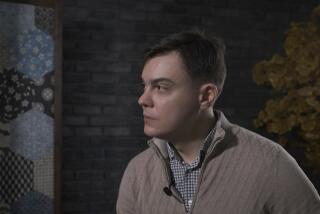When They Hear About ‘Reform,’ Many Russians See ‘Graft’
- Share via
MOSCOW — As President Clinton was heading to the Kremlin on Tuesday to urge Russia forward on the path toward economic reform, police officers were descending on the country house of a top government finance official to arrest him.
In a scene that has become increasingly familiar here, First Deputy Finance Minister Vladimir Petrov was hauled off to jail, accused of accepting a large bribe and taking illegal action on behalf of a bank.
Allegations of this sort illuminate what has gone wrong in Russia during its move toward a market economy and democratic society. To many Russians disillusioned by their experiment with capitalism, the words “market reform” have often come to mean a license to steal.
The era of President Boris N. Yeltsin and acting Prime Minister Viktor S. Chernomyrdin has witnessed widespread corruption in government and the rise of a handful of tycoons who control the economy while millions of ordinary citizens wait for their back wages and pensions.
“Any child in Russia will tell you that the main problem of the Russian government is the thieves who work in it,” said lawmaker Grigory A. Yavlinsky, leader of the pro-market Yabloko faction in the Duma, or lower house of parliament.
Yavlinsky’s comment came Monday as he argued against giving Chernomyrdin a second chance to serve as Russia’s prime minister. While Communists revile the wealthy Chernomyrdin for helping dismantle the Soviet state, pro-market liberals oppose him for helping to create a system of crony capitalism that has stifled competition and nearly bankrupted the government.
The Clinton administration has invested billions of dollars in the government of Yeltsin and Chernomyrdin in hopes that they will create a Western-style economy with open markets and laws to protect investors as well as consumers.
But, with the collapse of the Russian currency, the ruble, and a freeze on foreign debt payments last month, this nation’s future is far from clear.
The Central Bank, acknowledging the low value placed on the ruble by street-corner exchange booths, officially fixed the currency at 10.88 to the dollar starting today--a jump of 4 1/2 rubles in barely two weeks.
And Yeltsin’s decision to bring back Chernomyrdin to head the government, after five months of Prime Minister Sergei V. Kiriyenko, continued to draw protests Tuesday from parliamentary foes who pledged that Chernomyrdin will never win confirmation.
Communist Party leader Gennady A. Zyuganov, who earlier encouraged the military to block Yeltsin if he tries to dissolve parliament, said that the issue facing Russia is “the breakup of the country . . . the pushing of the country toward civil war and fierce confrontation.”
In response, the Federal Security Service--the main successor of the Soviet KGB--announced that the government will not use force to resolve the country’s crisis. Yeltsin “always tells us that we must observe the constitution,” said Vladimir Putin, the agency’s chief.
Meanwhile, Chernomyrdin, who became well known for his occasional odd turn of phrase during his first five years as prime minister, appeared before government ministers and made the case that he can bring the country back from the brink of fiscal collapse with a program of tax cuts and stricter government control of the economy.
“We have exhausted our limit of mistakes,” he said, adding obliquely at another point: “The deepening of reforms is the course we will not turn away from. But this course can be changed.”
The arrest of Petrov, who oversees the federal budget and the treasury, appeared to have no effect on the presidential summit. The Kremlin said it had no comment on the case.
While details remained unclear, the ORT television station reported that Petrov had been questioned earlier in connection with an embezzlement case against a deputy interior minister found to have $1 million in cash at his home.
Earlier this year, the onetime chief of Yeltsin’s privatization agency was charged with embezzlement for allegedly accepting an apartment in central Moscow. And the head of Yeltsin’s statistics office, a key post in economic planning, was arrested for accepting bribes to doctor figures. Police said $1 million was discovered in his apartment too.
“It doesn’t surprise anybody anymore,” said Leonid A. Radzikhovsky, political analyst for the newspaper Sevodnya. “If the government officials can do nothing to help the country, the logical thing for them is to at least help themselves.”
Sergei L. Loiko of The Times’ Moscow Bureau contributed to this report.
More to Read
Sign up for Essential California
The most important California stories and recommendations in your inbox every morning.
You may occasionally receive promotional content from the Los Angeles Times.










